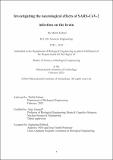Investigating the neurological effects of SARS-CoV-2 infection on the brain
Author(s)
Kabani, Malek
DownloadThesis PDF (6.661Mb)
Advisor
Jasanoff, Alan
Terms of use
Metadata
Show full item recordAbstract
SARS-CoV-2 and its associated disease COVID-19 is still a major public safety concern, three years into the global pandemic. While effective vaccines are readily available to protect against infection, major questions surround the long-term effect of SARS-CoV-2. Several patients report suffering from long-term COVID-19 neurological symptoms that include memory loss, and attention problems. Studying the molecular changes that occur in the brain upon infection and other cellular pathways that may be impacted will help us further understand the mechanism of neuroinvasion and what cell types are most vulnerable, in the hopes of developing therapies that target these markers. To this end, we used post-mortem brain samples to first see if we could detect the presence of SARS-CoV-2 in the brain. We then used RT-qPCR to determine whether the blood brain barrier was affected upon infection. Furthermore, we used a BBB in vitro model to determine the cells infected by SARS-CoV-2. We also used a pseudovirus to assess whether it recapitulates the same infection pattern as the live virus . Finally, we were interested in what cellular pathways this infection could also perturb. We hypothesized that SARS-CoV-2 could alter the Aβ uptake of pericytes and tested this hypothesis in our BBB model system using both the live virus and recombinant spike protein.
These results inform that SARS-CoV-2 alters the homeostasis in the brain and opens the door towards future research around other cellular pathways altered by COVID-19 brain infection.
Date issued
2023-02Department
Massachusetts Institute of Technology. Department of Biological EngineeringPublisher
Massachusetts Institute of Technology